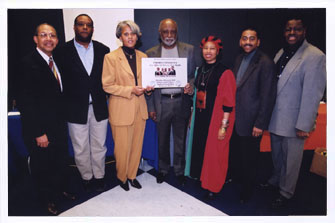- Posted in All University
- Category: Campus News
 Lincoln launched its Office of Minority Male Health on February 6 at the University’s Student Union Building. Lincoln received a grant from the U.S. Department of Health of Human Services/Office of Minority Health to advocate awareness, preventive behavior and education relative to minority male health. Pictured above from left are: Herschel Bailey ’66, director, Minority Male Health and Upward Bound Programs; Stefan Jordon ’85; Lisa Reeves, assistant director, Minority Male Health; President Ivory V. Nelson, Ph.D.; Dr. Ayo Sanyika ’76, director, ACT 101/TIME Learning Resource Center; David Strickland, M.D.; and Vincent Pearson ’72, M.D., senior medical director, Independence Blue Cross.
Lincoln launched its Office of Minority Male Health on February 6 at the University’s Student Union Building. Lincoln received a grant from the U.S. Department of Health of Human Services/Office of Minority Health to advocate awareness, preventive behavior and education relative to minority male health. Pictured above from left are: Herschel Bailey ’66, director, Minority Male Health and Upward Bound Programs; Stefan Jordon ’85; Lisa Reeves, assistant director, Minority Male Health; President Ivory V. Nelson, Ph.D.; Dr. Ayo Sanyika ’76, director, ACT 101/TIME Learning Resource Center; David Strickland, M.D.; and Vincent Pearson ’72, M.D., senior medical director, Independence Blue Cross.
Lincoln University, PA – Lincoln University recently received a $147,900 sub-contract grant from the Minority Male Health Consortium, Inc. to launch its new Office of Minority Male Health (OMMH). To kickoff the project, the OMMH will host a special welcoming reception at the University’s Student Union Building on February 6 from 5:30 p.m.-7:30 p.m.
Lincoln is one of five Historically Black Colleges and Universities (HBCUs) which compose the consortium. Participating HBCUs include Morehouse College, Morgan State University, Bowie State University and Wilberforce University. The Minority Male Health Consortium project received a $1 million grant from the U.S. Department of Health and Human Services/Office of Minority Health to address health awareness, prevention and education in chronic diseases relative to minority males.
Lincoln’s OMMH will function as part of the University’s Office of Student Affairs and Enrollment Management. Herschel Bailey, director of Lincoln’s Upward Bound Program, will also be director of Lincoln’s OMMH project. Bailey and his assistant director, Lisa Reeves, will assist the University in partnering with student groups, Philadelphia and its surrounding area high schools, community and faith-based organizations, as well as churches and community service agencies, to create programs that increase awareness and preventive behavior in relation to the disparities in minority male health.
Founded in 1854 as America’s first Historically Black University, Lincoln University combines the best elements of a liberal arts and sciences-based undergraduate core curriculum and selected graduate programs to meet the needs of students living in a highly technological and global society.
The University is nationally recognized as a major producer of African Americans with undergraduate degrees in the physical sciences (biology, chemistry and physics); computer and information sciences; and biological and life sciences. In addition, Lincoln is ranked first in Pennsylvania in the same categories.
From April 2003 through May 2004, the University will celebrate its sesquicentennial, or 150th anniversary, with an array of campus and external events, activities and announcements.